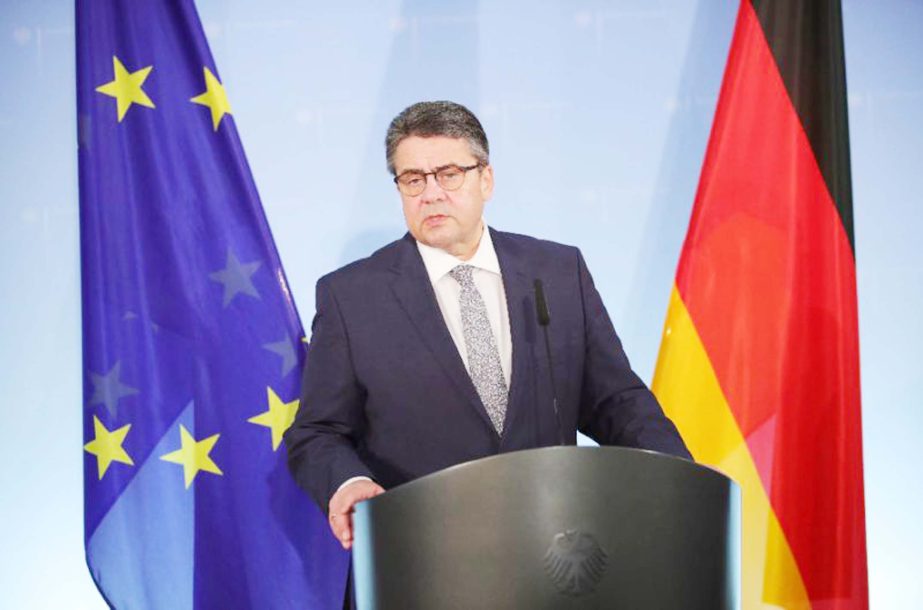
AFP, Berlin :
Germany on Wednesday urged Turkey to work toward restoring ties frayed by a series of bitter disputes but warned that any comparison to the Nazi era was a “red line that cannot be crossed”.
NATO allies Ankara and Berlin have been locked in a new row over the past week after several local authorities in Germany blocked rallies by Turkish ministers.
The dispute is the latest in a long list of problems that have plagued relations and comes just after Ankara’s arrest of a journalist for German daily Die Welt that sparked consternation in Berlin.
On Sunday, President Recep Tayyip Erdogan raised the stakes when he told a rally in Istanbul that the blocking of public appearances by his ministers was “not different from the Nazi practices of the past”.
German Foreign Minister Sigmar Gabriel, after hosting his Turkish counterpart Mevlut Cavusoglu for talks, said he had “made clear that comparisons between the Nazi era and the cancellation of rallies or the rule of law in Germany are unacceptable”.
“Both sides have a responsibility to simply not cross certain red lines, and comparisons to Nazi Germany are one of them,” said Gabriel.
Despite Berlin and Ankara’s deep differences on a host of issues, “there is no alternative to dialogue because that is the only way we can return, step-by-step, to a normal and friendly relationship,” he added.
Ties between Germany and Turkey have been particularly strained since last year’s a failed coup aimed at ousting Erdogan.
Berlin has emerged as a strident critic of Ankara’s vast crackdown in the aftermath of the putsch, which has seen more than 100,000 people arrested, suspended or sacked for alleged links to the plotters or to Kurdish militants.
Despite the tensions, Turkish ministers have been seeking to make campaign appearances in Germany ahead of an April referendum on expanding Erdogan’s powers.
The ministers are particularly anxious to tap into Germany’s Turkish community with its 1.4 million people who are eligible to vote-the fourth largest electoral base after Istanbul, Ankara and Izmir.
Germany on Wednesday urged Turkey to work toward restoring ties frayed by a series of bitter disputes but warned that any comparison to the Nazi era was a “red line that cannot be crossed”.
NATO allies Ankara and Berlin have been locked in a new row over the past week after several local authorities in Germany blocked rallies by Turkish ministers.
The dispute is the latest in a long list of problems that have plagued relations and comes just after Ankara’s arrest of a journalist for German daily Die Welt that sparked consternation in Berlin.
On Sunday, President Recep Tayyip Erdogan raised the stakes when he told a rally in Istanbul that the blocking of public appearances by his ministers was “not different from the Nazi practices of the past”.
German Foreign Minister Sigmar Gabriel, after hosting his Turkish counterpart Mevlut Cavusoglu for talks, said he had “made clear that comparisons between the Nazi era and the cancellation of rallies or the rule of law in Germany are unacceptable”.
“Both sides have a responsibility to simply not cross certain red lines, and comparisons to Nazi Germany are one of them,” said Gabriel.
Despite Berlin and Ankara’s deep differences on a host of issues, “there is no alternative to dialogue because that is the only way we can return, step-by-step, to a normal and friendly relationship,” he added.
Ties between Germany and Turkey have been particularly strained since last year’s a failed coup aimed at ousting Erdogan.
Berlin has emerged as a strident critic of Ankara’s vast crackdown in the aftermath of the putsch, which has seen more than 100,000 people arrested, suspended or sacked for alleged links to the plotters or to Kurdish militants.
Despite the tensions, Turkish ministers have been seeking to make campaign appearances in Germany ahead of an April referendum on expanding Erdogan’s powers.
The ministers are particularly anxious to tap into Germany’s Turkish community with its 1.4 million people who are eligible to vote-the fourth largest electoral base after Istanbul, Ankara and Izmir.

